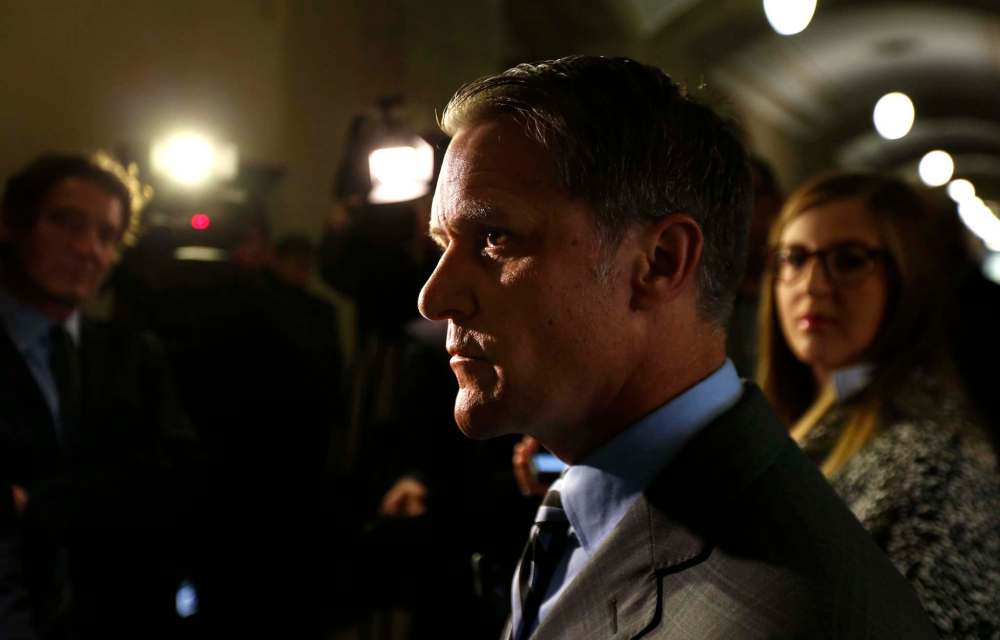Province releases KPMG report, wants to cut civil service by eight per cent
Advertisement
Read this article for free:
or
Already have an account? Log in here »
To continue reading, please subscribe:
Monthly Digital Subscription
$0 for the first 4 weeks*
- Enjoy unlimited reading on winnipegfreepress.com
- Read the E-Edition, our digital replica newspaper
- Access News Break, our award-winning app
- Play interactive puzzles
*No charge for 4 weeks then price increases to the regular rate of $19.95 plus GST every four weeks. Offer available to new and qualified returning subscribers only. Cancel any time.
Monthly Digital Subscription
$4.99/week*
- Enjoy unlimited reading on winnipegfreepress.com
- Read the E-Edition, our digital replica newspaper
- Access News Break, our award-winning app
- Play interactive puzzles
*Billed as $19.95 plus GST every four weeks. Cancel any time.
To continue reading, please subscribe:
Add Free Press access to your Brandon Sun subscription for only an additional
$1 for the first 4 weeks*
*Your next subscription payment will increase by $1.00 and you will be charged $16.99 plus GST for four weeks. After four weeks, your payment will increase to $23.99 plus GST every four weeks.
Read unlimited articles for free today:
or
Already have an account? Log in here »
Hey there, time traveller!
This article was published 03/10/2017 (3023 days ago), so information in it may no longer be current.
The Pallister government is seeking to reduce the size of the province’s civil service by eight per cent — about 1,200 positions — and it’s well on the way to achieving the goal.
Finance Minister Cameron Friesen announced the target Tuesday, while releasing a 750-plus-page consultant’s report by industry giant KPMG.
Friesen said the job cuts would occur mainly by attrition and would be spaced over three years, dating to when the Progressive Conservatives were elected to office (April 19, 2016).

!function(e,t,s,i){var n=”InfogramEmbeds”,o=e.getElementsByTagName(“script”),d=o[0],r=/^http:/.test(e.location)?”http:”:”https:”;if(/^/{2}/.test(i)&&(i=r+i),window[n]&&window[n].initialized)window[n].process&&window[n].process();else if(!e.getElementById(s)){var a=e.createElement(“script”);a.async=1,a.id=s,a.src=i,d.parentNode.insertBefore(a,d)}}(document,0,”infogram-async”,”https://e.infogram.com/js/dist/embed-loader-min.js”);
A report released this week indicates the government led by Premier Brian Pallister has already achieved more than half of its goal.
According to the Manitoba Civil Service Commission annual report, there were 14,876 civil servants (including term, casual and contract employees) on March 31, 2016. By March 31 of this year, there were 14,162, a reduction of 714.
There has not been this few civil servants in Manitoba since the spring of 2008, under the Gary Doer-led NDP. The numbers peaked at 15,300 under then-NDP premier Greg Selinger in 2012.
Under the NDP, Friesen said, Manitoba’s civil service grew considerably compared with bureaucracies in other jurisdictions.
"The size of the civil service in Manitoba is more than 20 per cent larger than the national average," he told reporters.
Last October, the Progressive Conservatives announced they would reduce the number of government middle and senior managers by 112 positions, claiming management ranks had ballooned 33 per cent since 2005. It’s now clear they’ve been looking at rank and file civil service positions, as well, for quite some time.
The Tory government received the first draft of KPMG’s fiscal performance review in September 2016 and the final report in December, but refused to release it until Tuesday.
The report says, with an annual staff turnover rate of eight per cent, there are opportunities to create a more efficient civil service.
The massive document recommends savings in numerous areas, including staffing and procurement, the management of capital projects, less direct support for business and holding the line on operating grants to colleges and universities.
While the government, until this week, has ignored repeated calls for the report’s release, it has been steadily implementing its recommendations.
It is taking a similar approach with a KPMG report on health-care sustainability. It, like the fiscal performance review, has been in the hands of government for months. While the government has been implementing many of its findings, it said Tuesday it won’t release the document before May 31.
Friesen said it is not an opportune time to release the health report while the system is undergoing substantial changes and the government is focused on better patient care.
"I think it would be unhelpful to dump that 500-page report on the table right now," he said. "I think it would add confusion. I think it would not bring about a sense of comfort."
NDP finance critic James Allum said it was cynical for the PCs to sit on both reports for so long after promising during the provincial election they would usher in a new era of openness and accountability in government. Both reports should have been released long ago, he said.
"Instead what we had is (government) cuts first, context second," Allum said. "That strikes me as a government that is arrogant and it’s cynical."
Michelle Gawronsky, president of the Manitoba Government and General Employees’ Union, said the loss in civil-service positions is already being felt. Cutting 1,200 positions by March 2019 will exacerbate the situation, she said.
"Who’s going to provide the services? Who’s going to do the jobs that need to be done?" she said, adding many existing staff are already "doing the jobs of two people."
The cuts will mean fewer probation officers keeping communities safe, fewer water-testers to protect the environment, fewer workers to keep children in care safe, and fewer highways staff to clear snow off roads, Gawronsky said.
Phase 1 and Phase 2 of the Fiscal Performance Review can be viewed here.
larry.kusch@freepress.mb.ca


